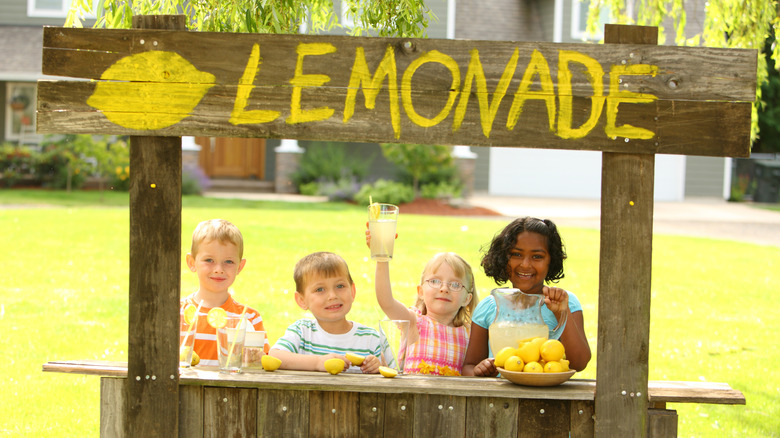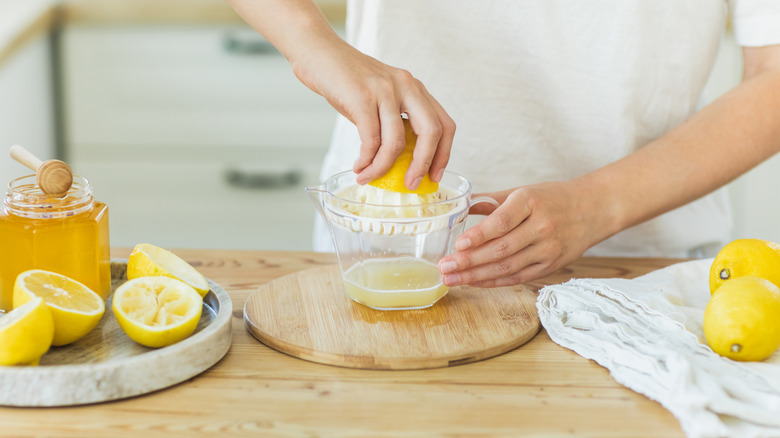They're Cute, But Most Lemonade Stands Are Completely Illegal
If you're not located in one of the 14 states where lemonade stands are allowed without permits, your kid's summer business could be shut down. Yes, it's true: Law enforcement isn't above slapping fines on innocent kids trying to make a little cash on a summer day. Lemonade stands without permits are legal only in California, Colorado, Connecticut, Illinois, Louisiana, Missouri, Nebraska, Nevada, New York, North Dakota, Rhode Island, Texas, Utah, and Vermont. Everywhere else, regulations will vary, so it's important to check with local permitting bodies.
For example, in my city of Portland, Oregon, you can only sell commercially packaged lemonades or drink mixes made with bottled water, which, if you ask me, squeezes all of the fun out of the whole thing. In 2010, Multnomah County even made headlines after it shut down a 7-year-old kid's lemonade stand at an art fair.
The crackdown on kids' lemonade stands has been so significant over the years, it inspired both parents and organizations to stand up. In 2011, Robert Fernandes, a Philadelphia dad of two, declared August 20 "Lemonade Freedom Day" to protest the lemonade stand shut-downs. In 2018, Country Time (the lemonade brand) started offering to cover any fines children's lemonade stands incurred with its now-defunct "Legal-Ade" campaign.
Localized efforts have been effective. Illinois youth got lemonade stand privileges in 2021 thanks to Hayli's Law, named after Hayli Martenez, who started a lemonade stand at 11-years-old to raise money for her college fund but was shut down by police. In February 2025, Indiana's House of Representatives passed a bill lifting restrictions on children's lemonade stands. Organizations like Lemonade Day support these efforts and provide programming for young entrepreneurs.
Making lemonade stands safe
Although shutting down a child's lemonade stand seems like a total Grinch move, the health inspectors do have a point. All raw juices can be dangerous because of possible bacterial contamination. When you grab a cup of lemonade made from scratch, you have no way of knowing if the lemons or the hands that squeezed them were clean. Most people seem willing to accept this. After all, we risk foodborne illness whenever we go to a dinner party or eat homemade baked goods. To preserve this quintessential childhood entrepreneurship experience, we all have to trust that our neighbors have the best intentions.
If you're helping a child set up a stand or even hosting a summer lemonade party yourself, you can do your part by ensuring homemade drinks are safe to consume. Of course, maintaining clean hands throughout making and serving the lemonade is key! Start by thoroughly washing the lemons and scrubbing them with a produce brush. Dry them with a clean towel before juicing them. Once you have extracted the juice, sweeten with sugar or honey to taste and then pasteurize it. It sounds cumbersome, but really, all you have to do is heat the juice to 203 degrees Fahrenheit for 15 seconds. You can then dilute the base with water, transfer the mixture to sanitized containers, and stash it in the fridge.
When it comes to serving the lemonade at the stand, it is best to sell the drinks in sealed containers to avoid cross-contamination from hands, cups, or anything in the environment. Keep the bottles of lemonade ice cold in a clean cooler, and make sure kids (and adults!) are washing their hands frequently, especially after handling money.

